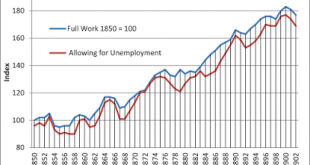This post first appeared on Pieria in November 2013. Throughout history, humans have dreamed of plenty. They have longed for there to be abundant supplies not only of essentials, but of luxuries. The promise made to the Israelites wandering in the desert was that they would eventually come to a land “flowing with milk and honey”. And the vision of the New Jerusalem in Revelation is of riches beyond imagination. Recent forecasts of forthcoming abundance, too, have focused on...
Read More »Keynes and the death of capitalism
In a recent article for the New Statesman, the economics commentator Grace Blakeley makes an extraordinary claim. Writing about the origins of the IMF, she says: Seventy-five years have passed since these international financial institutions were created in Bretton Woods, New Hampshire, in 1944. Back then, delegates sought to tame the power of international finance, the growth of which helped to cause the 1929 Wall Street Crash and the ensuing Great Depression. JM Keynes – who led the...
Read More »Brian Romanchuk
In previous articles (example), I have been arguing that investment is the major driver of the private sector cycles. (I am using the national accounting definition of investment, and not the act of purchasing financial securities.) We can now turn to the data, and the important question: how are we doing right now?… There are a number of categories of expenditures that are all lumped under the notion of investment. The major categories of interest are: Investment by government (which is...
Read More »The misery of Mitie
The failure of Carillion has brought to light widespread moral hazard in the outsourcing sector. For years, companies that deliver crucial public services relied on expectation of government support to keep their borrowing costs low and enable them to please shareholders by giving dividends they couldn't afford. They, and the banks and investors that funded them, assumed they were too important to fail. So when Carillion was on the brink of failure, RBS tightened the screws, clearly...
Read More »Productivity and Employment: A Cautionary Tale
Ah, productivity. Who knew that our whole prosperity was totally dependent on a concept as nebulous as this?To be sure, it doesn't sound nebulous. It is output per worker per hour. What is so difficult about that?The problem is how you define "output". Usually, we take this to mean GDP (gross domestic product), though we might use GNP (gross national product) or GVA (gross value added). In this post, I shall use GDP.As Diane Coyle has engagingly written, GDP is a deeply flawed measure....
Read More »Thomas Piketty — Re-thinking the capital code
All these studies have one thing in common: they demonstrate that reflection on power relationships and property, which for a moment was thought to have been annihilated after the Soviet disaster, in reality is only beginning. Europe and France must take their rightful place. The magic work — "power." Le blog de Thomas Piketty — EnglishRe-thinking the capital code Thomas Piketty | Professor at EHESS and at the Paris School of Economics
Read More »David Harvey — The value of money [excerpt]
Value is a social relation. As such, it is ‘immaterial but objective.’ The ‘phantom-like objectivity’ of value arises because ‘not an atom of matter enters into the objectivity of commodities as values’. Their status as values contrasts with ‘the coarsely sensuous objectivity of commodities as physical objects. We may twist and turn a single commodity as we wish; it remains impossible to grasp it as a thing possessing value.’ The value of commodities is, like many other features of social...
Read More »How Eleanor Marx understood her Father’s Wage Determination Theory
From Eleanor Marx Aveling’s essay “The Woman Question” (1886): “They forget that by capitalist employers this very sex-helplessness of woman is only taken into account with the view of lowering the general rate of wages. Again, there is no more a natural calling of woman than there is a natural law of capitalistic production, or a natural limit to the amount of the labourer’s product that goes to him for means of subsistence. That in the first case, woman’s calling is supposed to be only the...
Read More »Marx’s Dishonesty in his Quotation of Gladstone
In volume 1 of Capital in Chapter 25, Marx reproduces a selective quotation from William Gladstone on the condition of the working classes in England from a speech Gladstone gave in the House of Commons on 16 April 1863: “On April 16th, 1863, 20 years later, in the speech in which he introduced his Budget [sc. Gladstone said]: ‘From 1842 to 1852 the taxable income of the country increased by 6 per cent In the 8 years from 1853 to 1861 it had increased from the basis taken in 1853 by 20 per...
Read More »My Critical Summaries of Volume 1 of Marx’s Capital
Marx published volume 1 of Capital in German in 1867 (by the publisher Meissner of Hamburg), but this was the only volume of Capital, which was a proposed 4 volume work on economics, to be published in Marx’s lifetime. Volumes 2 and 3 were edited and published by Engels after the death of Marx. No English translation of volume 1 appeared in Marx’s lifetime either.In the summaries below, I have used these two translations of volume 1: Marx, Karl. 1906. Capital. A Critique of Political Economy...
Read More » Heterodox
Heterodox





